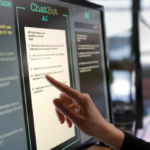AI is revolutionizing the way companies hire, ushering in a new era of recruitment practices. In this article, we’ll explore the profound impact of artificial intelligence on the hiring landscape. No longer confined to traditional methods, recruiters now leverage AI tools for more efficient and objective decision-making.
Imagine a world where the initial stages of recruitment are seamlessly handled by algorithms, scanning vast datasets to pinpoint the ideal candidate. This paradigm shift isn’t just a trend—it’s a fundamental transformation in how businesses build their teams.
From automated sourcing to personalized candidate interactions, AI streamlines processes, ensuring a smoother experience for employers and applicants. In this journey through the transformative power of AI in recruitment, we’ll uncover the advantages, tackle challenges, and glimpse into the exciting future of hiring powered by artificial intelligence.
Let’s dive into the future of recruitment, where innovation meets opportunity.

Here’s How AI is Transforming Recruitment
In the fast-evolving world of recruitment, artificial intelligence (AI) has emerged as the catalyst for a seismic shift in how organizations attract and select talent.
. The Rise of Automated Sourcing
AI’s impact begins at the very first step—sourcing. Automated tools tirelessly sift through a multitude of resumes, scanning for skills, qualifications, and experiences that align with job requirements. This means recruiters spend less time on manual screening, allowing them to focus on strategic aspects of the hiring process.
. Screening and Shortlisting Made Efficient
Once a pool of potential candidates is identified, AI takes charge of the screening and shortlisting process. Gone are the days of manually analyzing each resume. Instead, algorithms analyze data at lightning speed, evaluating candidates against predefined criteria. This ensures that only the most qualified individuals move forward, saving time and resources for both recruiters and applicants.
. Personalized Interaction through Chatbots
Enter the era of personalized communication. AI-driven chatbots engage with candidates in real time, providing information, answering queries, and collecting essential data. This streamlines the application process and enhances the overall candidate experience. It’s like having a virtual assistant available 24/7, guiding applicants through the recruitment journey.
. Predictive Analytics for Cultural Fit
Beyond skills and qualifications, cultural fit has become a paramount consideration. AI utilizes predictive analytics to assess how well a candidate aligns with the organization’s culture. By analyzing past data, AI predicts whether a candidate is not just a skill match but a harmonious fit within the company culture. This ensures a more holistic and effective hiring decision.
. Mitigating Unconscious Bias
AI is a powerful ally in the quest for a fair and unbiased recruitment process. Traditional methods often harbor unconscious biases, but AI focuses on objective data, eliminating subjective elements that can lead to discrimination. The result? A more diverse and inclusive workforce that reflects the true spectrum of talent.
. Ensuring Fairness in Decision-Making
AI continually learns and adapts, ensuring fairness in decision-making. It removes subjective elements by relying on data-driven insights, creating a transparent and equitable recruitment process. This enhances the credibility of hiring decisions and builds trust among candidates.
. Ethical Concerns in AI Recruitment
As AI becomes integral to recruitment, ethical considerations emerge. Transparency in algorithms, data privacy, and the responsible use of technology are crucial to address. Companies must navigate these ethical challenges to build trust with candidates and the wider community.
. Overcoming Algorithmic Challenges
While AI holds immense potential, it has its challenges. Algorithmic biases can inadvertently perpetuate existing inequalities. Understanding and working to overcome these biases is essential for creating a fair and just recruitment process.
. Integration of AI with Human Expertise
The future of recruitment lies in a collaborative approach that combines AI efficiency with human expertise. Human recruiters bring nuanced understanding, emotional intelligence, and the ability to assess intangible qualities that AI may struggle to grasp. The optimal balance is a synergy where technology enhances human capabilities.
. Customized Skill Development Plans
AI’s predictive capabilities extend beyond hiring; they venture into anticipating future skill requirements. AI can create customized employee skill development plans by analyzing industry trends and company needs. This forward-thinking approach ensures organizations stay ahead in a rapidly evolving job market.

Best AI Tools to Use in the Recruitment Process
The market has a long range of AI tools to streamline the recruitment process. Some of these important yet trending tools are listed below:
1. Textio
Textio takes the guesswork out of writing compelling job descriptions. Using AI, it analyzes language patterns that resonate with candidates and suggests edits to attract a diverse pool of applicants. This ensures your job postings are enticing and inclusive, reaching a broader spectrum of potential talent.
2. HireVue
HireVue brings the power of video interviews to a new level. AI analyzes verbal and non-verbal cues, providing insights into a candidate’s communication skills, emotional intelligence, and cultural fit. This tool saves time and ensures a more comprehensive understanding of a candidate beyond the traditional resume.
3. Harver
Harver revolutionizes the screening process. With AI-driven pre-employment assessments, it evaluates candidates based on skills, competencies, and cultural fit. This not only streamlines the shortlisting process but ensures that only the most qualified individuals proceed to the following stages of recruitment.
4. Ideal
Ideal automates the candidate sourcing process. Using AI algorithms, it scours various platforms to identify potential candidates whose skills match the job requirements. This tool significantly reduces the time recruiters spend on manual sourcing, allowing them to focus on more strategic aspects of the hiring process.
5. XOR
XOR takes candidate communication to the next level with its AI-powered chatbots. These virtual assistants engage with candidates in real time, answering queries, scheduling interviews, and providing a seamless experience. This enhances the candidate experience and frees up valuable time for recruiters.
6. SeekOut
SeekOut leverages AI to facilitate diversity and inclusion in hiring. It identifies potential candidates based on skills and ensures a diverse pool by considering factors like gender, ethnicity, and background. This tool aligns with the growing importance of building diverse and inclusive teams.
7. Talentsoft
Talentsoft focuses on the entire employee lifecycle. AI helps in talent acquisition, onboarding, performance management, and career development. This comprehensive approach ensures that organizations find the right talent and nurture and retain them for long-term success.
In short, these AI tools are not just innovations; they are practical solutions to the evolving challenges of recruitment. By incorporating these tools into your hiring process, you save time and resources and enhance the overall quality of your talent acquisition efforts. Embrace the future of recruitment with these cutting-edge AI tools, and watch as your organization attracts, evaluates, and retains top-tier talent seamlessly.
Challenges of Using AI Tools in Recruitment
As organizations use the power of AI tools in recruitment, they encounter a large range of challenges. While these tools promise efficiency and innovation, understanding and mitigating potential pitfalls is crucial for successful implementation.
Let’s explore the challenges organizations may face when incorporating AI into their recruitment processes.
. Algorithmic Biases
One significant challenge in deploying AI tools in recruitment is the potential for algorithmic biases. These biases can inadvertently perpetuate existing inequalities, favoring certain demographics over others. It’s crucial to constantly monitor and fine-tune algorithms to ensure fair and unbiased decision-making.
. Data Privacy Concerns
As AI tools rely on vast amounts of data for analysis, concerns about data privacy become prominent. Ensuring compliance with data protection regulations and transparently communicating the data usage policies to candidates are essential to mitigating these concerns.
. Lack of Human Touch
While AI streamlines processes, there’s a risk of losing the human touch in recruitment. Candidates value personal interactions, and an over-reliance on AI tools, especially in communication, can lead to a diminished candidate experience. Balancing efficiency with personalized human engagement is key.
. Limited Understanding of Nuances
AI tools, while powerful, may struggle to grasp the nuances of human behavior, cultural fit, and subjective qualities. This limitation can result in overlooking valuable candidates who may bring intangible qualities to the team. Human recruiters need to step in to assess these aspects effectively.
. Overcoming Resistance to Change
Introducing AI tools often requires more support from existing teams accustomed to traditional methods. Overcoming this resistance requires effective communication, showcasing the benefits of AI in enhancing efficiency and enabling recruiters to focus on higher-value tasks.
. Ethical Considerations
Ethical dilemmas arise in the use of AI, particularly in decision-making processes. Questions about who is accountable for decisions made by AI tools and how ethical standards are embedded in algorithms need careful consideration. Establishing clear ethical guidelines is crucial.
. Costs and Implementation Challenges
While AI tools offer long-term benefits, the initial investment and implementation can pose challenges. Organizations may face costs associated with training, integration with existing systems, and regular updates. Planning for these costs and addressing implementation challenges is vital for a smooth transition.

Tips to Use AI Tools in Recruitment
Undoubtedly, all AI tools remove the worries of recruiting different deserving candidates. But there are many challenges as well. To cover these challenges, one should stick to the basic tips for using AI tools in the hiring process.
. Understand Your Needs
Before diving into the world of AI tools, assess your specific recruitment needs. Identify areas where automation can enhance efficiency and bring value to your hiring process. Whether it’s automating candidate sourcing, streamlining screening, or improving diversity and inclusion, clarity on your objectives is the first step to successful implementation.
. Provide Adequate Training
Introducing AI tools requires a certain level of expertise. Ensure your recruitment team is well-trained in the functionalities of the chosen tools. This maximizes the tools’ effectiveness and boosts your team’s confidence in leveraging technology for better results.
. Integrate AI Seamlessly
AI tools should seamlessly integrate into your existing recruitment infrastructure. Ensure compatibility with your applicant tracking system (ATS) and other relevant platforms. A smooth integration minimizes disruptions, allowing your team to harness the benefits of AI without facing technical hurdles.
. Leverage Data Insights
AI tools generate valuable data insights that can inform your recruitment strategy. Utilize analytics provided by these tools to understand the effectiveness of your hiring processes, identify areas for improvement, and make data-driven decisions. This iterative approach ensures continuous enhancement in your recruitment strategies.
. Ensure Compliance and Ethical Use
As you embrace AI in recruitment, be vigilant about ethical considerations and legal compliance. Ensure that your AI tools adhere to privacy regulations and anti-discrimination laws. This protects your organization from legal issues and fosters trust with candidates and stakeholders.
. Maintain Human Touch
While AI tools bring efficiency, maintaining a human touch is essential. Personalized communication, especially during the initial stages of recruitment, contributes to a positive candidate experience. Use AI-powered chatbots judiciously, ensuring they enhance, not replace, the human connection in your hiring process.
Conclusion:
Integrating AI tools in recruitment marks a pivotal shift in how organizations attract and retain talent. As we navigate this transformative landscape, embracing change and addressing challenges is key.
In this journey, consider iApply as a standout tool for job applications. Its intuitive interface, advanced algorithms, and user-friendly features streamline the application process, making it a valuable asset in the quest for top-tier talent.








